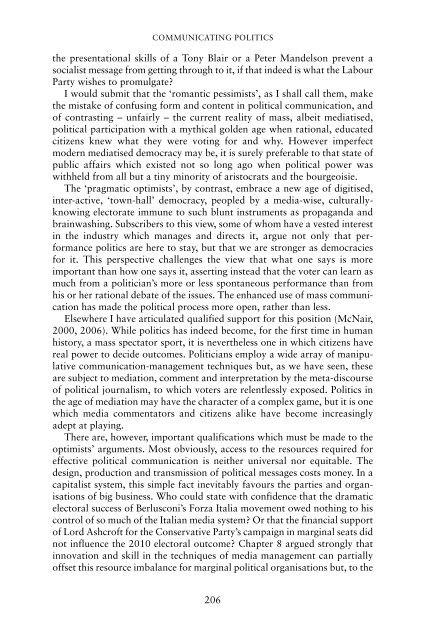20130412164339753295_book_an-introduction-to-political-communication
20130412164339753295_book_an-introduction-to-political-communication
20130412164339753295_book_an-introduction-to-political-communication
Create successful ePaper yourself
Turn your PDF publications into a flip-book with our unique Google optimized e-Paper software.
COMMUNICATING POLITICS<br />
the presentational skills of a Tony Blair or a Peter M<strong>an</strong>delson prevent a<br />
socialist message from getting through <strong>to</strong> it, if that indeed is what the Labour<br />
Party wishes <strong>to</strong> promulgate?<br />
I would submit that the ‘rom<strong>an</strong>tic pessimists’, as I shall call them, make<br />
the mistake of confusing form <strong>an</strong>d content in <strong>political</strong> <strong>communication</strong>, <strong>an</strong>d<br />
of contrasting – unfairly – the current reality of mass, albeit mediatised,<br />
<strong>political</strong> participation with a mythical golden age when rational, educated<br />
citizens knew what they were voting for <strong>an</strong>d why. However imperfect<br />
modern mediatised democracy may be, it is surely preferable <strong>to</strong> that state of<br />
public affairs which existed not so long ago when <strong>political</strong> power was<br />
withheld from all but a tiny minority of aris<strong>to</strong>crats <strong>an</strong>d the bourgeoisie.<br />
The ‘pragmatic optimists’, by contrast, embrace a new age of digitised,<br />
inter-active, ‘<strong>to</strong>wn-hall’ democracy, peopled by a media-wise, culturallyknowing<br />
elec<strong>to</strong>rate immune <strong>to</strong> such blunt instruments as propag<strong>an</strong>da <strong>an</strong>d<br />
brainwashing. Subscribers <strong>to</strong> this view, some of whom have a vested interest<br />
in the industry which m<strong>an</strong>ages <strong>an</strong>d directs it, argue not only that perform<strong>an</strong>ce<br />
politics are here <strong>to</strong> stay, but that we are stronger as democracies<br />
for it. This perspective challenges the view that what one says is more<br />
import<strong>an</strong>t th<strong>an</strong> how one says it, asserting instead that the voter c<strong>an</strong> learn as<br />
much from a politici<strong>an</strong>’s more or less spont<strong>an</strong>eous perform<strong>an</strong>ce th<strong>an</strong> from<br />
his or her rational debate of the issues. The enh<strong>an</strong>ced use of mass <strong>communication</strong><br />
has made the <strong>political</strong> process more open, rather th<strong>an</strong> less.<br />
Elsewhere I have articulated qualified support for this position (McNair,<br />
2000, 2006). While politics has indeed become, for the first time in hum<strong>an</strong><br />
his<strong>to</strong>ry, a mass specta<strong>to</strong>r sport, it is nevertheless one in which citizens have<br />
real power <strong>to</strong> decide outcomes. Politici<strong>an</strong>s employ a wide array of m<strong>an</strong>ipulative<br />
<strong>communication</strong>-m<strong>an</strong>agement techniques but, as we have seen, these<br />
are subject <strong>to</strong> mediation, comment <strong>an</strong>d interpretation by the meta-discourse<br />
of <strong>political</strong> journalism, <strong>to</strong> which voters are relentlessly exposed. Politics in<br />
the age of mediation may have the character of a complex game, but it is one<br />
which media commenta<strong>to</strong>rs <strong>an</strong>d citizens alike have become increasingly<br />
adept at playing.<br />
There are, however, import<strong>an</strong>t qualifications which must be made <strong>to</strong> the<br />
optimists’ arguments. Most obviously, access <strong>to</strong> the resources required for<br />
effective <strong>political</strong> <strong>communication</strong> is neither universal nor equitable. The<br />
design, production <strong>an</strong>d tr<strong>an</strong>smission of <strong>political</strong> messages costs money. In a<br />
capitalist system, this simple fact inevitably favours the parties <strong>an</strong>d org<strong>an</strong>isations<br />
of big business. Who could state with confidence that the dramatic<br />
elec<strong>to</strong>ral success of Berlusconi’s Forza Italia movement owed nothing <strong>to</strong> his<br />
control of so much of the Itali<strong>an</strong> media system? Or that the fin<strong>an</strong>cial support<br />
of Lord Ashcroft for the Conservative Party’s campaign in marginal seats did<br />
not influence the 2010 elec<strong>to</strong>ral outcome? Chapter 8 argued strongly that<br />
innovation <strong>an</strong>d skill in the techniques of media m<strong>an</strong>agement c<strong>an</strong> partially<br />
offset this resource imbal<strong>an</strong>ce for marginal <strong>political</strong> org<strong>an</strong>isations but, <strong>to</strong> the<br />
206
















